Indscribe
Eid-uz-Zuha will be celebrated tomorrow. I have got leave from office and will take rest after prayer. As Eid approaches, once again people keep asking, 'Which Eid is that? Baqrid or the 'Siwain wali'.
And then the confusion over spellings. Eeryone is in doubt whether to use the Arabic, the Urdu, the hybrid style or the desi--Baqrid.
Nice to see how newspaper in English spell it differently every time. Eid-ul-Zuha, Eid-uz-Zuha, Eid-ul-Azha, Eid-ul-Adha or then all the same derivatives with Id, Idul et al
So what's the correct spelling?
Firstly, you can write Eid or Id, both are correct.
Now the question of the middle word.
The 'ul' works with both 'Zuha' and 'Azha'. But 'uz' with 'Zuha' only.
The suffix can be 'Zuha' or 'Azha'.
So all these are equally correct: Id-ul-Zuha, Id-ul-Azha, Id-uz-Zuha. Even Id-ul-Adha is correct though its recent import. In Arab, it is common to use Adha. But that's not proper in the context of Indian sub-content.
Here, we still say Ramzan, not Ramadan.
We also say, 'Zohar' prayer, not 'Dhuhr'. For us, it is Fazal, not Fadhal. If we go on Arabising, then our entire language will change. And everything becomes a joke. The way Arabs pronounce certain letters is slightly different from Indian, Pakistani or even Persian pronunciation.
Arabs don't have P in the alphabet and they use B for it. So will Pakistan call itself Bakistan? No. Arabic doesn't even have 'G' or the sound of Urdu 'Gaaf'. There is a limit to which this madness can go. Let's not be ashamed of our pronunciation or our culture. The 'mithi' Eid which comes after Ramzan, is Eid-ul-Fitr. There is less chance of spelling mistake here.
Generally, it is called Baqreed or Baqr'id. For God sake, don't say 'Bakra Id'. Hope I have clarified to an extent. Still, if you insist on replacing your 'Zo', 'Zaal' and 'Zuaad' with 'Dh', and try being more Arab than Indian, Bangladeshi or Pakistani, then you can surely do it.
Hope I have clarified certain confusions that come annually prior to the Eid(s). I am quite happy today as I got a cute 'bag-cum-radio' as a gift. It has a radio on the front side and the bag can be attach to the belt or slung on the shoulder.
It looks lovely. I can't understand the mechanism but everybody who saw it, liked it. Now read an Urdu Nazm. Titled 'Marine driver', it has been written by well-known poet Adil Mansoori. You may have heard of his famous Nazm 'Tubook' also.
Marine Drive: An Urdu verse
Shahariyon se tang aa kar
Shor se daaman chhuRa kar
Unchi unchi buildinge.n
Khudkushi karne ki khaatir
Saf-ba-saf daryaa kinare
Der se aakar khaRii hain
[Adil Mansoori]





































